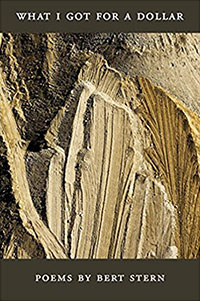
*
Review by Dennis Daly (Off the Shelf Correspondent)
If ever there were a tour de force of poetic cravings this is it. What I Got for a Dollar is Somerville poet Bert Stern’s third poetry collection and it’s magnificent. Stern craves deeply, but not shrilly, the cause behind the cause of creation. He makes the basic argument for divinity’s possibility as deftly as Thomas Aquinas ever did. Perhaps better. In fact, the somewhat absent minded Deity that Stern conjures up behind his naturalistic images seems eminently likable, albeit dependent on humanity for help in keeping up appearances.

What I Got For A Dollar
Poems by Bert Stern
Off the Grid Press
Boston, MA
www.grid-books.org
ISBN: 978-1-946830-01-2
93 Pages
$16.00
Everything depends on the focus in Stern’s poems. In one poem he considers the micro world, Blake’s grain of sand. In other contexts the poet ponders over what he curiously calls “the ordinary.” Occasionally he jumps off the earth’s edge to commune with more fearsome, macro and fiery powers. Even the political and the comic are not beyond Stern’s observational attention. Also, throughout the collection, the poet works in an exquisite commentary on aging. He embeds it in both his persona’s longings and perceptions.
Before the first section of poems Stern positions an elegant poetic inscription, which acts as a prologue of sorts and speaks to the poet’s overriding motivation. Here is a portion of it,
Behind the ripples
in water,
behind old age,
torrents of spring
plunge down mountains.
Under my face
I crave another face,
as if behind it all
a God still sleeps…
On the Ausable, the poem that opens the collection, portrays the poet-protagonist following a riverside path in the aftermath of a rain storm, seeking the most basic things and the most tangible concepts. He appears fragile yet full of life and describes his trek thusly,
I wobble down the rough path
of the bank, propped by love
and a broken stick, eyes
agog with dappled water.
On the cobbled beach
totter over stones,
breathe beginnings in…
The title poem, What I Got for a Dollar, sounds like an intended political piece, dark and forbidding, that pushed back against its author and had its way. Comedy and newfound optimism result. Here’s the heart of the piece,
…the man in the Red Sox cap
who loves Jesus (it says on the button pinned to the cap),
offers to help me lug groceries, and though, upstairs,
I give him a dollar
he doesn’t do it for that because, when I look for another one,
he waves it off.
“This works,” he says, so I know he really loves Jesus.
Contra my argument, love looks out, waiting for us to notice.
It’s springtime, and all the swelling renewal is like love.
I try to imagine a time after money, after celebrities
have stopped shouting
and the words a child says as I walk hand in hand with her
sound like salvation: timbre and innocence and openness
to what’s to come.
My favorite poem in the collection, entitled The Ordinary, considers the scene beyond our present tame realty. Every day we pour over our books, or screens, or peer through our pleasant windows. Habit and routine control all. Only imagination delivers divergent details on sedate creation and suggests the numinous, the feral and, possibly, the continuous. The poet concludes his piece with an arresting contrast,
The palette’s simple as the scene: skies gray
or blue or dappled, rain, snow or nothing falling,
a tree, one tree I’ve pruned and love
because it’s red and green and Japanese and
longest to hold its leaves.
Up ahead a gale’s coming in, but the ordinary prow
keeps its nose to the wind.
Up ahead rumbling thunder, visions of shipwreck,
but something sails on, and I’m haunted by
this ghost, this thin aroma
brilliant and concealed.
As if, behind the same old, a different face looks out
Through glowing-ember eyes.
Stern’s ekphrastic poem, Samuel Palmer’s Trees, works wonderfully well verbalizing the original painting, Palmer’s The Gleaning Field (1833). But Stern goes much further. He uses the painting as a way in, a way to explore metaphysical implications of the work. Consider this description of laboring peasants,
…the gleaners keep their eyes
on the ground, to pluck what’s left
from wheat stubble.
Soon darkness falls over them,
but for now it’s hard to name what
lurks in the waning light.
I might say “God,” but which?
The one who sees all but feels
nothing?
The people are hungrier than
the cattle, who freely gaze
amid the wheat still to be harvested.
God can’t remember why
he sent creation forth, and
his creatures never knew.
Craving a deeper reality or a more fulfilling reality doesn’t just happen. Usually it begins with a wound, a tear in the fabric of ordinary life. In Riding Bareback in the Tropics, Stern’s persona discovers an antidote to lost love by going South. Citrus delights await. Most of us at one time or another have this urge. Some even buy the epistemological ticket. But few go. Perhaps it’s the coral snakes that dissuade us. Stern’s protagonist packs up and leaves. Here he describes the adventure and the aha-moment that follows,
So it came about, all old ties broken,
high in the canopies, spider monkeys noisier
than neighbors, air orchids the horses loved
to eat. One night, drunk, I galloped bareback
round the rim of a great, natural bowl, with only
my thighs to gird me against the unnamed hurt
I somehow managed to keep dodging,
even among coral snakes.
By reducing his spiritual cravings to poetry Bert Stern has, in a very real sense, already created what he seeks. Words become beginnings; they fill up nothingness with creative constructions that allow us to comprehend the nature of things and, by extension, nature. Lucky for Stern to have written this book. Double lucky for his readers.















Reader Comments